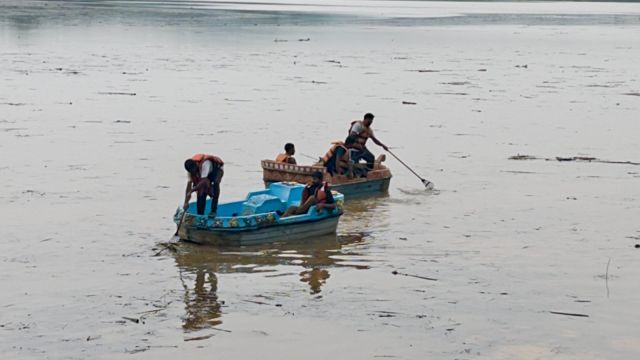Sukhna Lake left clogged with silt and debris after heavy rain
Boating resumes after clean-up but visitors raise alarm over pollution, aquatic life, and lack of long-term solutions
 While pedal boat rides resumed after 2:30 pm, many parts of the lake remained visibly polluted despite hours of cleaning. (Express photo)
While pedal boat rides resumed after 2:30 pm, many parts of the lake remained visibly polluted despite hours of cleaning. (Express photo)Heavy rain in the Shivalik foothills on Monday night led to a surge in water levels at Sukhna Lake but also brought with it a wave of silt, driftwood, and garbage. By Tuesday morning, the lake was littered with debris, prompting an early clean-up by the Municipal Corporation.
While pedal boat rides resumed after 2:30 pm, many parts of the lake remained visibly polluted despite hours of cleaning. “Boat services had to be halted as the inflow from the hills carried silt and large branches into the lake, making it unsafe,” said Vinod Bhatt, a boating staff member. “Most of the floating debris that could have posed danger to boats has been removed.”
 “Most of the floating debris that could have posed danger to boats has been removed,” said Vinod Bhatt, a boating staff member.
“Most of the floating debris that could have posed danger to boats has been removed,” said Vinod Bhatt, a boating staff member.
Another staffer, Vikas, said the water level had risen, as expected during the monsoon, but this time it brought in “a lot more filth.”
Regular visitors expressed disappointment over the lake’s condition. “We came early for a morning walk, but the water was muddy and filled with floating wood,” said Poonam, a tourist from Himachal Pradesh. Local student Rajveer Singh added, “There’s garbage near the shore. I hope the MC finishes cleaning it soon. Sukhna deserves better upkeep.”
Swadesh Talwar, veteran photo editor and long-time visitor to the lake, said the real concern is the threat to aquatic life. “With the accumulation of dirt and mud, fish and other organisms struggle to breathe and eventually die,” he said.
Talwar suggested constructing check dams in the catchment area to slow water flow during heavy rainfall. “Right now, rainwater rushes in with silt and debris, and there’s nothing to stop or filter it,” he said.
He also pointed to the growing presence of invasive white lotus plants in the lake. “They’re treated as ornamental but are actually weeds. Removing them costs a lot, and even after all the spending, the problem keeps returning.”
Commenting on governance, Talwar said the root issue lies in administrative detachment. “Officers from other states are sent here on deputation. They have no real stake in Chandigarh. They come, make their money, and leave. Responsibility should lie with officials from the Chandigarh cadre—those settled here and accountable.”
Recalling a time in the late 1980s when the lake dried up completely, he shared how a citywide desilting campaign revived it. “I had suggested to the then Chief Commissioner, Ashok, that he lead the effort. For two years, citizens turned up early in the morning, patriotic songs played, and people voluntarily cleaned the lake. Since then, it has never dried up completely.”
“There’s always a way to solve a problem,” Talwar said. “But it takes genuine involvement. People must care from the heart and commit to long-term solutions, not just temporary fixes.”












